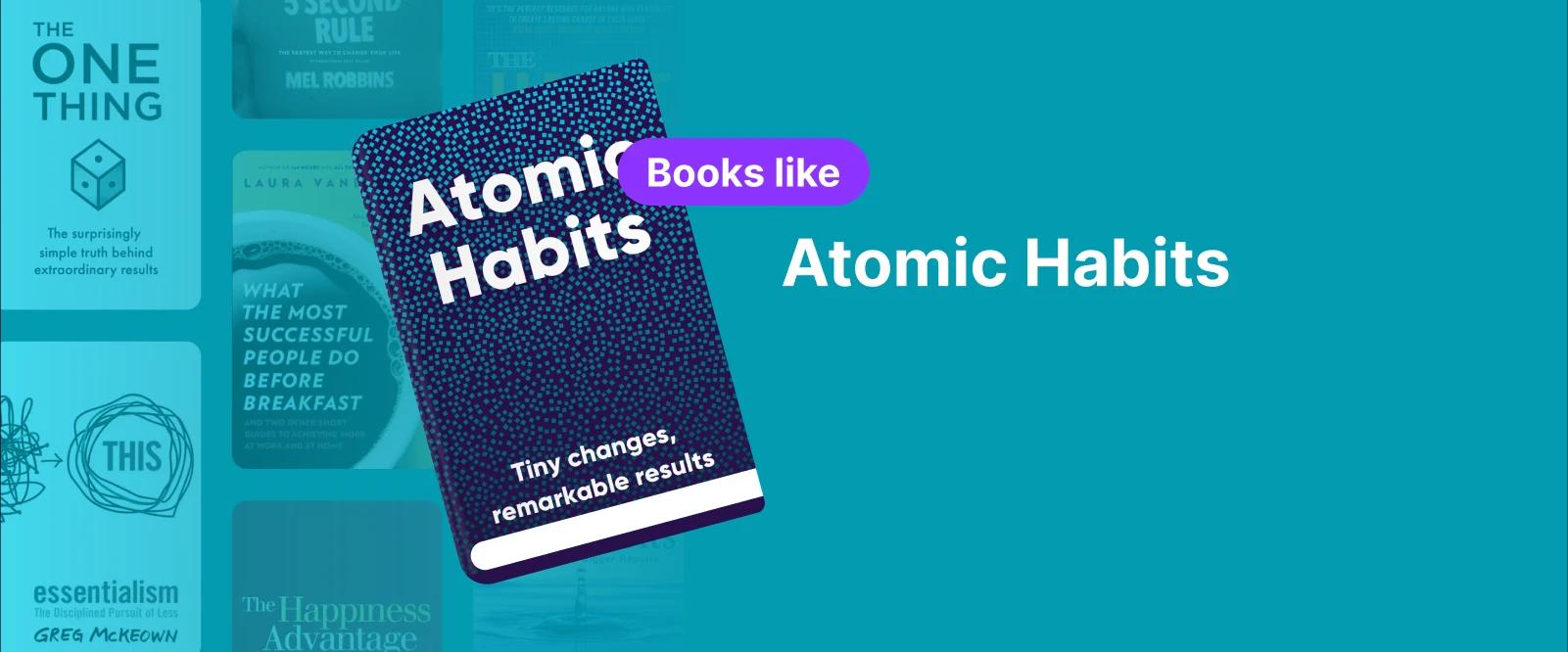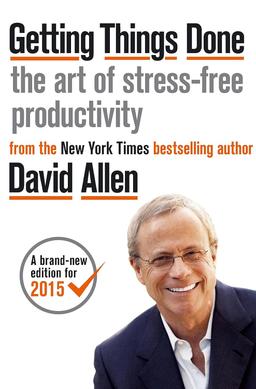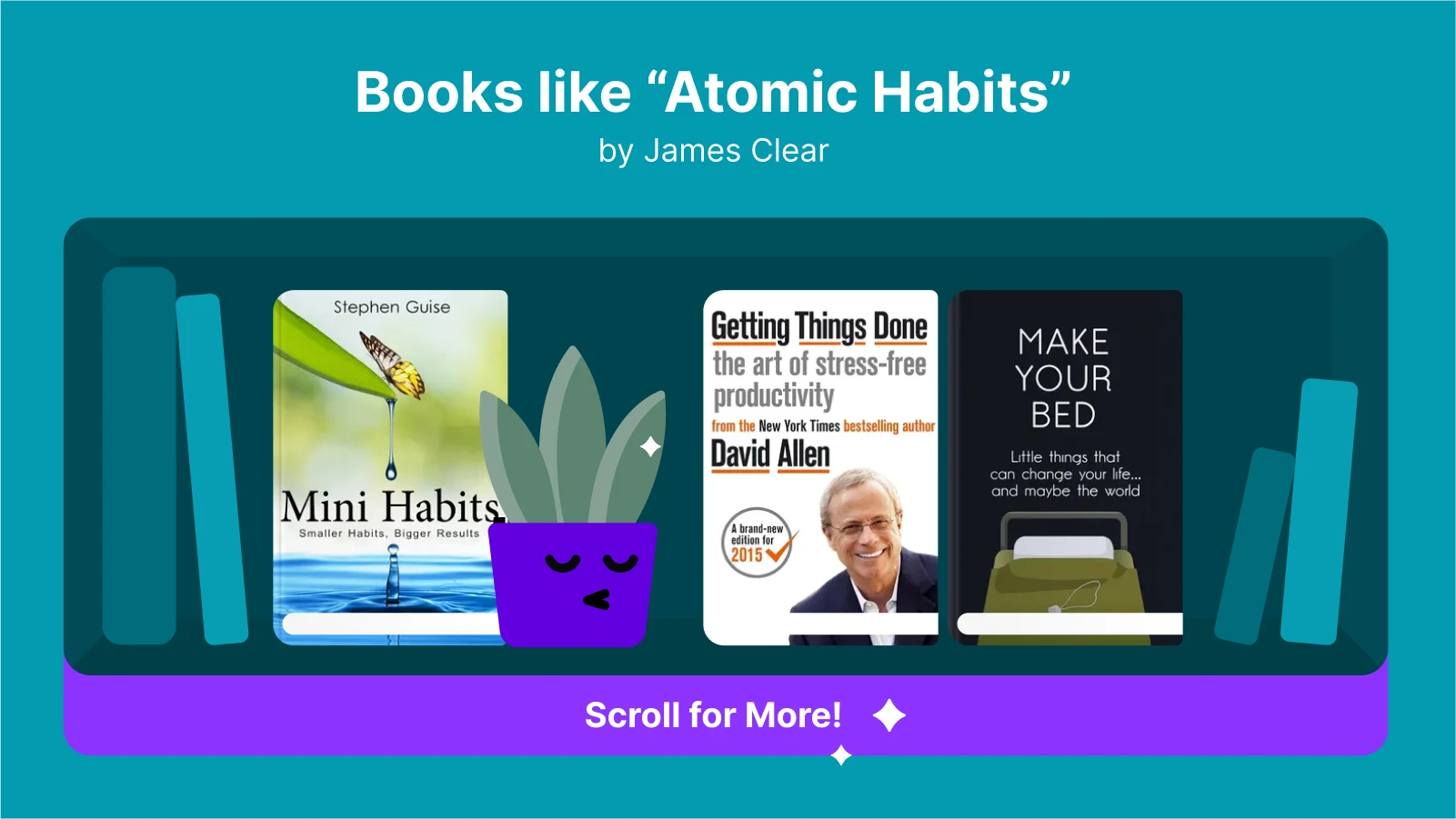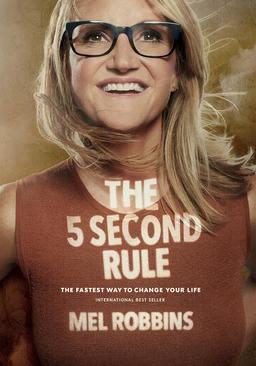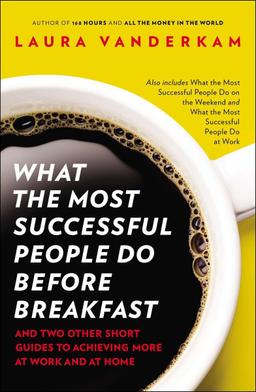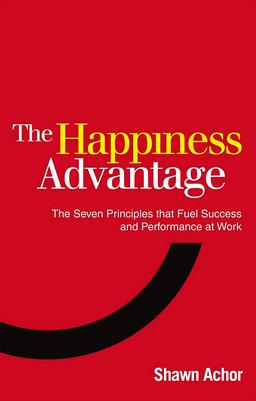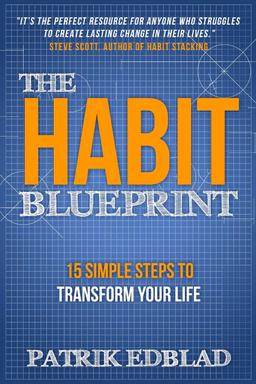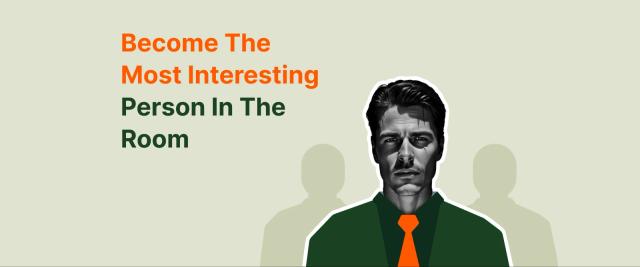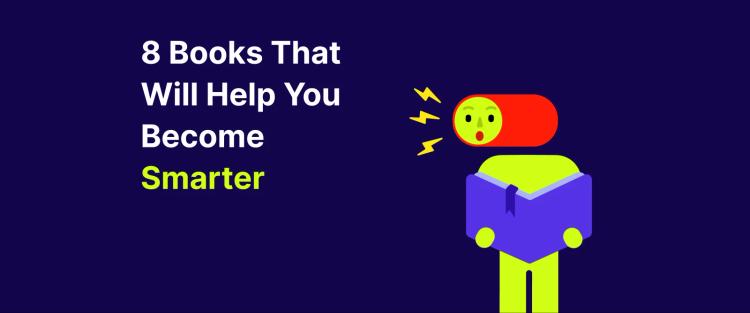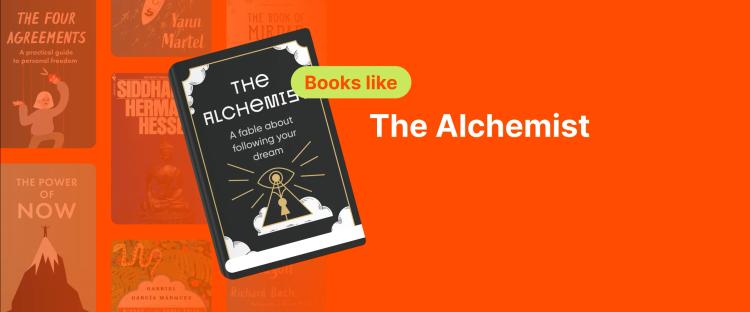So you finished 'Atomic Habits', and you're hungry for more? Maybe you've already started doing one push-up a day (James Clear would be proud). Now you want to dive deeper into the world of habit formation and self-improvement.
You're in the right place. We've found a list of 14 must-read books that'll help you build good habits and finally break those bad ones. Think of this as your personal book club list — minus the wine and cheese.
📘 One push-up down, 14 books to go? Get Headway to finish the whole list in under 4 hours!
Quick answer: What are the Atomic Habits book alternatives to read in 2025?
Can't stop putting things off? These five self-help books will help you actually take action:
'Mini Habits' by Stephen Guise — Start ridiculously small. One push-up. One sentence. Your brain won't fight you on something that takes 30 seconds.
'Getting Things Done' by David Allen — Get everything out of your head and into a system. When you know exactly what to do next, you stop avoiding tasks.
'The Power of Habit' by Charles Duhigg — Understand your procrastination patterns. Once you see why you delay, you can interrupt the cycle.
'The Science of Self-Discipline' by Peter Hollins — Build willpower like a muscle. Follow his blueprint to make action automatic, not agonizing.
'The 5 Second Rule' by Mel Robbins — Count 5-4-3-2-1 and move before your brain makes excuses. This simple countdown beats hesitation every time.
The magic behind 'Atomic Habits' by James Clear
Here's what makes the 'Atomic Habits' book so powerful: tiny changes add up to massive results. You don't need to overhaul your entire life overnight. Start small. Really small.
Clear shows you how to break down those intimidating goals into bite-sized actions. Want to read more? Start with one page. Want to exercise? Put on your gym shoes. That's it. The book teaches you to make habit formation so easy you can't say no.
Your environment matters too. Clear explains why your couch might be sabotaging your workout plans. And why keeping cookies on the counter guarantees you'll eat them. It's all about designing your space to support your goals.
📘 Love Clear's approach? Download Headway for 14 more habit systems that actually work!
14 best books to boost your personal development journey
1. 'Mini Habits: Smaller Habits, Bigger Results' by Stephen Guise
Stephen Guise gets it — your brain hates change. That's why his mini-habit strategy is genius. Instead of "write 2,000 words," try "write one sentence." Your brain won't fight you in one sentence.
Guise discovered this accidentally when he couldn't motivate himself to exercise. His solution? One push-up. Just one. That tiny commitment turned into a full workout. And eventually, a daily exercise habit.
Why you'll love it if you liked 'Atomic Habits':
Both authors believe tiny actions create huge results.
You'll learn to outsmart your brain's resistance.
Starting small means you'll actually stick with it.
Mental barriers don't stand a chance against mini habits.
2. 'Getting Things Done' by David Allen
Your brain isn't meant to be a storage unit. David Allen's GTD system gets everything out of your head and into a trusted system. No more 3 AM panic about forgotten tasks.
The method is simple: capture everything, clarify what it means, organize by context, and review regularly. Sounds boring? Maybe. But you know what's not boring? Having mental clarity and zero stress about your to-do list.
Why it complements 'Atomic Habits':
Both books love breaking things into manageable pieces.
You get practical strategies that actually work.
Mental barriers disappear when tasks are clear.
Systems beat willpower every time.
3. "The Power of Habit" by Charles Duhigg
Charles Duhigg is like the detective of habit formation. He reveals the "habit loop" — cue, routine, reward. Once you understand this loop, you can hack it.
This bestseller shows how habits work in your brain. And in companies. Even in societies. Duhigg proves that understanding patterns is the first step to changing them.
What makes it essential reading:
Deep dive into the psychology of habits work.
Learn to identify and change your habit loops.
Real stories of transformation (personal and organizational).
Science-backed strategies for behavior change.
4. "Make Your Bed" by Admiral William H. McRaven
A Navy SEAL teaching you about making your bed? Stick with it. McRaven's point is brilliant — start your day with one completed task. That tiny win creates momentum.
His Navy SEAL training taught him that discipline in small things leads to discipline in all things. Plus, if your day goes sideways, you still come home to a made bed. Sometimes that's enough.
Why it works with habit formation principles:
Small daily actions create big life changes.
Discipline starts with the simplest tasks.
Morning routines set the tone for everything.
Control what you can control.
📘 Want discipline that starts small? Get Headway for military-grade habit wisdom from elite performers!
5. "The One Thing" by Gary Keller and Jay Papasan
Stop juggling twenty goals. Keller and Papasan argue for radical focus. What's the ONE thing that makes everything else easier? Do that first.
This approach sounds simple because it is. But simple doesn't mean easy. This self-help book helps you identify your most important task and protect time for it.
Key takeaways for habit builders:
Focus beats multitasking every time.
Success comes from doing less, but better.
Prioritize based on impact, not urgency.
Simplicity is a superpower.
6. "Essentialism: The Disciplined Pursuit of Less" by Greg McKeown
Greg McKeown wants you to stop saying yes to everything. 'Essentialism' isn't about doing more things efficiently. It's about doing the right things, period.
This philosophy pairs perfectly with atomic habits. Why build twenty mediocre habits when you could master three game-changing ones?
Why fans of Clear will appreciate McKeown:
Less is more (seriously).
Eliminate the non-essential ruthlessly.
Focus on habits that truly matter.
Quality beats quantity in personal growth.
7. "The 5 Second Rule" by Mel Robbins
Five, four, three, two, one — GO. That's Mel Robbins' entire system. When you hesitate, count backward and move. It sounds too simple to work. But it does.
Robbins discovered this technique during her lowest point. Now millions use it to beat procrastination and anxiety. The countdown interrupts your brain's excuse factory.
How it enhances your habit practice:
Immediate action beats perfect planning.
Stop overthinking, start doing.
Small behavioral changes, big results.
Works for any habit you're building.
8. "Indistractable" by Nir Eyal
Your phone is designed to steal your attention. Nir Eyal shows you how to fight back. This isn't about going off-grid. It's about choosing where your attention goes.
Eyal reveals why we get distracted (hint: it's not the technology). Then he provides tools to stay focused on what matters.
Essential insights for habit success:
Environmental design is everything.
Understand your distraction triggers.
Build focus like you'd build any habit.
Practical strategies for the digital age.
📘 Attention constantly hijacked? Download Headway for focus-reclaiming strategies from attention experts!
9. "What the Most Successful People Do Before Breakfast" by Laura Vanderkam
Morning people aren't born — they're made. Laura Vanderkam studied successful people's morning routines. Turns out, they protect those early hours like gold.
Before the world wakes up, you can exercise, write, or work on passion projects. No interruptions. No excuses. Just you and your most important work.
Morning routine wisdom:
Early hours = peak willpower.
Routines eliminate decision fatigue.
Structure creates freedom.
Small morning wins compound.
10. "The Science of Self-Discipline" by Peter Hollins
Peter Hollins breaks down willpower like a scientist. Self-discipline isn't about being tough. It's about understanding your psychology and working with it.
The book combines research with practical tools. You'll learn why you procrastinate and exactly how to stop.
Discipline insights that stick:
Willpower is a skill, not a trait.
Small wins build discipline muscle.
Mental barriers are predictable (and beatable).
Systems matter more than motivation.
11. "The Happiness Advantage" by Shawn Achor
Shawn Achor flips success on its head. We think success brings happiness. Wrong. Happiness brings success. The good news is that happiness is a habit you can choose and cultivate.
This book shows how a positive mindset improves everything — productivity, creativity, even health. Achor backs it up with brain science and practical exercises.
Why happiness matters for habits:
Positive emotions fuel habit formation.
Small daily practices reshape your brain.
Science-based strategies that work.
Mindset drives behavior change.
12. "The Slight Edge" by Jeff Olson
Jeff Olson's message is simple: small daily choices create your future. That chapter or Netflix episode? Tiny decisions compound over time.
The slight edge philosophy echoes atomic habits perfectly. Success isn't about massive action. But you need patience to feel it.
Core principles for lasting change:
Daily disciplines create destiny.
Compound effect works both ways.
Success is boring (and that's okay).
Small choices, massive impact.
📘 Small choices, massive results? Start Headway for compound-effect secrets that actually pay off!
13. "The Habit Blueprint" by Patrik Edblad
Patrik Edblad gives you 15 clear steps to build any new habit. No fluff. No theory. Just a practical blueprint you can follow today.
This great book breaks habit formation into manageable chunks. Each step builds on the last. By the end, you have a bulletproof habit.
Blueprint highlights:
Step-by-step guidance anyone can follow.
Small, manageable actions throughout.
Overcome mental barriers systematically.
Long-term strategies that stick.
14. "Designing Your Life" by Dave Evans and Bill Burnett
Two Stanford professors apply design thinking to life. Instead of finding your passion, build it. Instead of one perfect path, prototype several.
This book helps you experiment with different habits and lifestyles. Try things. Keep what works. Ditch what doesn't.
Design principles for habit builders:
Life is a design project.
Small experiments beat big plans.
Iterate your way to success.
Action creates clarity.
How to implement new habits in daily life?
Ready to put these ideas into practice? Here's your action plan:
Start with mini habits. Stephen Guise's style. One push-up. One sentence. One minute of meditation. Make it so small you can't fail.
Use the 5-second rule. When you feel resistance, count 5-4-3-2-1 and move. Don't let your brain talk you out of action.
Focus on one thing. Pick one habit. Master it. Then add another. Trying to change everything guarantees you'll change nothing.
Design your environment. Remove friction from good habits. Add friction to bad habits. Make success the easy choice.
Track your progress like a pro
Want to see your habits stick? Track them. We've created free printable trackers that actually work:
Habit Tracker. Track multiple habits for 30 days. Watch your streak grow and celebrate those small wins. Get your free habit tracker.
Daily Habit Tracker. Focus on your most important daily routines. Perfect if you're building one habit at a time. Download the daily tracker.
Mindfulness Journal. Combine habit tracking with self-reflection. Notice patterns in your mood and energy. Start journaling today.
SMART Goal Template. Turn vague wishes into clear action plans. This template makes goal-setting foolproof. Plan your goals here.
Print them out. Stick them on your fridge. Keep them in your planner. The best tracker is the one you'll actually use.
Make Headway your daily growth partner
Love these book recommendations, but short on time? We've got great news — you don't need hours to learn from the best printed or audiobooks.
The Headway app turns 'Atomic Habits' and 2,000+ other nonfiction books into 15-minute summaries. Read or listen while you're waiting for coffee or taking a lunch break.
With Headway, you're not just consuming content. You're building a daily learning habit. Open the app and you'll find:
Daily insights. Start each morning with a powerful idea from books like 'Deep Work' or 'The 7 Habits of Highly Effective People'.
Learning streaks. Watch your progress grow day by day. Miss a day? No guilt trips, just gentle reminders to get back on track.
Personalized recommendations. Based on your goals, Headway suggests what to read next. Into productivity? Meet Cal Newport. Ready for mindset work? Hello, Brené Brown.
Key takeaways that stick. You get actionable insights you can use from day one. Each book's wisdom, distilled to what actually matters.
Choose text or audio. Switch between English, Spanish, and other languages. Cover everything from James Clear to BJ Fogg, from business to wellness to relationships.
Your future self will thank you for starting today.
Download Headway and make reading a daily habit. You can also read Headway's summary of 'Atomic Habits' for free — it's the perfect place to refresh your knowledge and begin implementing them in life.
Frequently asked questions about books like "Atomic Habits"
What book should I read after reading "Atomic Habits"?
Start with "Tiny Habits" by BJ Fogg or "Deep Work" by Cal Newport. Also check out "The 7 Habits of Highly Effective People'"by Stephen Covey. Gretchen Rubin's work on habits is also worth exploring. For a different angle, try "The Subtle Art of Not Giving a F*ck" or anything by Brené Brown. Simon Sinek's "Start With Why" connects purpose to habits beautifully.
Is "Atomic Habits" helpful for ADHD?
Absolutely. The tiny steps work great for ADHD brains since breaking tasks into micro-actions makes them less overwhelming. Daily routines provide structure without rigidity. Small wins build momentum without burnout.
Why do habits matter for personal growth?
Habits shape 40% of your daily actions. Change your habits, change your life. They affect your productivity, health, relationships — everything. The compound effect means today's habits create tomorrow's results.
How does the environment affect habit formation?
Your space triggers behaviors. Cookies on the counter? You'll eat them. Books by your bed? You'll read more. Design your environment to make good habits automatic and bad habits hard.
What are the best strategies for beating procrastination?
Start stupidly small. Use the "Nothing Alternative" — do the task or do nothing. Focus on the very next step, not the whole project. Build routines that eliminate decisions. Remember: motion beats meditation.

